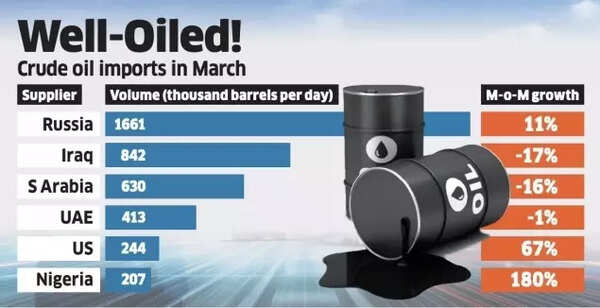Trump Faces Challenges in Ukraine Peace Deal
US Displeases Both Russia & Ukraine
Indian refiners boosted US crude imports by 67% in March compared to February, as Donald Trump promotes American energy exports. Despite January sanctions, Russian imports grew by 11%.
Trump hinted at possible complications for Russian oil trade if Moscow doesn’t reach an agreement on the Ukraine conflict. He announced plans to implement secondary duties ranging from 25-50% on Russian oil exports and prohibiting buyers from US business operations.
Mukesh Kumar Surana, CEO of Ratnagiri Refinery and Petrochemicals Ltd, said, “Trump’s threats seem more like posturing in his ongoing negotiations with Russia.” He added, “Refiners will need to be prepared with scenario analyses to ensure the economic sourcing of crude oil.”

Crude oil imports in March
Industry leaders doubt Trump will take substantial measures that would significantly reduce Russian oil’s presence in global markets, as it would increase fuel costs and conflict with his commitment to maintain affordable energy prices for American consumers.
India’s US crude imports reached 244,000 barrels per day (bpd) in March, increasing from 146,000 bpd in February. Russian crude imports increased by 11% to 1.66 million barrels per day (mbd) in March compared to the previous month.
This increase occurred despite broader predictions and initial vessel loading patterns, as Russia and traders discovered methods to bypass US sanctions for delivering shipments to Indian ports. The US implemented sanctions on two Russian producers and approximately 180 vessels involved in Russian oil transportation on January 10.
Surana said, “More suppliers, especially those with tankers loaded with Russian oil, would have been in a hurry to offload their inventories due to rising uncertainties, giving Indian importers economic choices, which led to increased imports from Russia in March.”
Supplies from Iraq and Saudi Arabia, India’s second and third-largest crude providers, declined significantly by 16-17% in March compared to February. Saudi Arabia increased its official selling price for March, anticipating higher demand from Indian purchasers following the sanctions.
Indian refiners acquired more from the US and Nigeria whilst reducing imports of less cost-effective Saudi and Iraqi crude. Nigerian imports increased substantially to 207,000 bpd in March from 74,000 in February.
Surana added, “Recently, sweet crude grades were economically attractive given their shrinking differential with sour grades, which predominantly come from the Middle East.”




